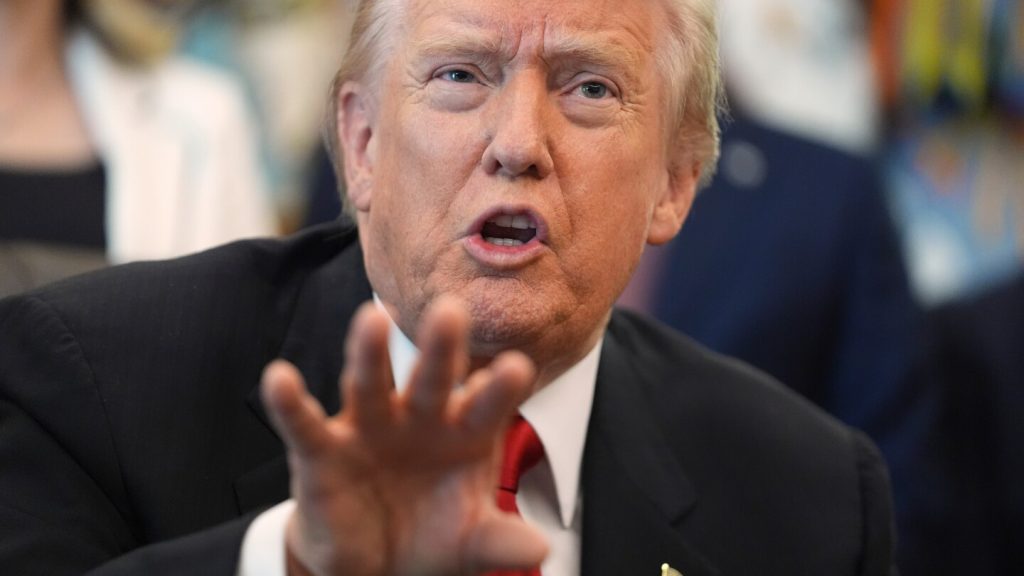Listen to the article
President Trump Pivots Economic Message to Address Voter Affordability Concerns
President Donald Trump is recalibrating his economic message to focus on affordability after Republicans suffered significant losses in Tuesday’s elections, where voters overwhelmingly cited economic concerns as their top priority.
The White House is now emphasizing Trump’s plans for tax breaks and anti-inflation measures after Democrats successfully leveraged affordability issues to secure victories in the New Jersey and Virginia gubernatorial races. These losses have transformed what was once considered a strength for Trump into a potential vulnerability heading into the 2024 midterm elections.
“We are the ones that have done a great job on affordability, not the Democrats,” Trump declared Thursday during an Oval Office event where he announced price reductions for anti-obesity drugs from pharmaceutical companies Eli Lilly and Novo Nordisk. “We just lost an election, they said, based on affordability. It’s a con job by the Democrats.”
The administration has intensified its messaging on consumer costs, regularly posting about Thanksgiving dinner prices at major retailers like Walmart, Lidl, Aldi and Target. “I don’t want to hear about the affordability, because right now, we’re much less,” Trump told reporters, suggesting Republicans have failed to effectively communicate their economic achievements.
Economic indicators, however, paint a more complex picture. Inflation has actually worsened under Trump’s watch, with consumer prices in September increasing at an annual rate of 3%, up from 2.3% in April when he began implementing substantial tariff hikes. According to AP Voter Poll data, the economy dominated voter concerns across multiple state elections on Tuesday.
Grocery prices continue to climb, and electricity bills have emerged as a new financial pressure point for many Americans. Simultaneously, job growth has slowed significantly, dropping 23% from the pace a year ago. This economic reality contrasts with White House talking points that highlight record stock market performances and foreign investment.
White House spokesman Kush Desai emphasized positive economic indicators, noting, “Americans are paying less for essentials like gas and eggs, and today the Administration inked yet another drug pricing deal to deliver unprecedented health care savings for everyday Americans.” However, Trump’s claim that gasoline averages $2 per gallon conflicts with AAA data showing a national average of $3.08.
According to a senior White House official, Trump receives weekly economic briefings from Treasury Secretary Scott Bessent and other officials, with plans to increase domestic travel next year to promote his affordability agenda.
Critics remain skeptical about Trump’s ability to change public perception. “He’s in real trouble and I think it’s bigger than just cost of living,” said Lindsay Owens, executive director of Groundwork Collaborative, a liberal economic advocacy group. Owens noted that Trump has “lost his strength” on economic issues as voters increasingly question his leadership compared to Democrats.
The administration plans to roll out new affordability policies, though details remain sparse. White House officials indicate a significant messaging shift ahead of tax season, with plans to educate voters about how Trump’s income tax cuts, part of a comprehensive bill Republicans passed in July, will affect their April tax refunds.
The White House anticipates economic improvement in the coming months, particularly after Federal Reserve Chair Jerome Powell’s term ends in May. The administration expects consistent interest rate cuts, cooling inflation, and reduced federal budget deficits to boost market sentiment.
Recent economic research, however, suggests Trump’s tariff policies may be exacerbating inflation. A study by Harvard economist Alberto Cavallo and colleagues found that without Trump’s tariffs, the inflation rate would have been substantially lower at 2.2%. The administration disputes these findings, maintaining that tariffs are benefiting the economy.
The Supreme Court is currently reviewing the legality of Trump’s tariff strategy, with justices appearing skeptical during Wednesday’s hearing about presidential authority to impose tariffs without congressional approval. Trump has somewhat moderated his previous claim that foreign countries, not American consumers, pay the tariffs, now saying, “They might be paying something. But when you take the overall impact, the Americans are gaining tremendously.”
Fact Checker
Verify the accuracy of this article using The Disinformation Commission analysis and real-time sources.




10 Comments
Interesting strategy shift for Trump. Addressing affordability is important, but he’ll need to demonstrate real, tangible solutions to convince a skeptical public.
Agreed. Voters will be looking for specific, actionable policies – not just talking points. The proof will be in the results, not the promises.
Interesting pivot for Trump. Addressing affordability is crucial, but the details and follow-through will be key. Voters are understandably skeptical of political rhetoric on this issue.
I agree, the proof will be in the policy proposals and their real-world impact on consumer prices.
Affordability is a major concern for many Americans right now, so it makes sense for Trump to focus on that. But his record on the issue will be heavily scrutinized.
Absolutely, his past claims about economic performance will be closely examined. Voters want to see concrete plans, not just rhetoric.
Tackling affordability is a smart move by Trump, but he’ll need to back it up with credible plans. Voters have heard a lot of rhetoric before and want to see real change.
Focusing on affordability is a smart move for Trump, but he’ll need to demonstrate real, tangible solutions to regain the trust of a skeptical electorate.
It’s good to see Trump pivot to addressing affordability concerns. However, his past record on economic issues will make many voters skeptical of his claims.
Exactly. Voters want to see detailed, realistic proposals – not just political posturing. The proof will be in the pudding, as they say.